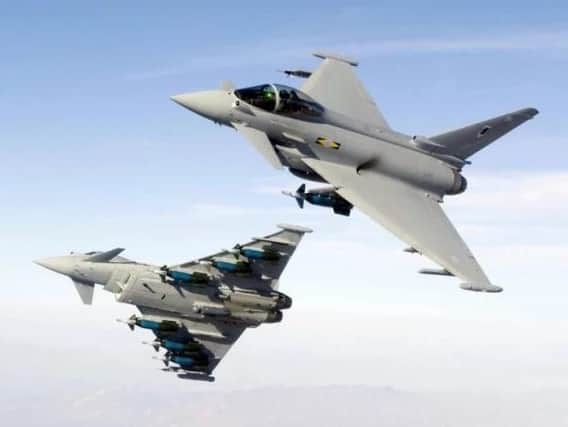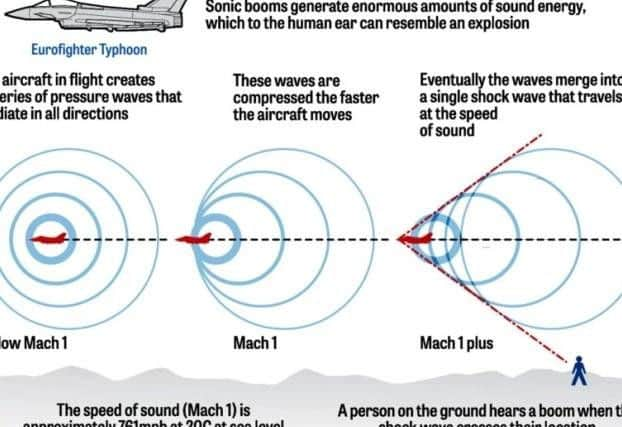One year on: The sonic boom that rocked Leeds & Yorkshire


A sonic boom tore through the air on May 2, 2016, terrifying and baffling residents across the county.
But what was the cause of the big bang?
The phenomenon happens when an object travels faster than the speed of sound. And on May 2, there were two of them above the city after a pair of RAF Typhoon jets were scrambled to intercept a suspicious plane.


Advertisement
Hide AdAdvertisement
Hide AdIt was the explosion-like sound caused by the military jets that had residents in Leeds and other parts of the region worried.
The jets’ path took them straight over Leeds-Bradford Airport and YEP readers reported that the noise shook houses and rattled windows.
Andy Norris, from South Milford, said: “It was so loud that it shook the pointing around our bedroom window onto the roof of our conservatory. I’ve never in my life heard such a loud noise.”
Aviation expert Dr Stephen Wright said it was understandable for people to be concerned because it was such an unusual event. He said: “I live in Far Headingley and at first I thought a car must have ploughed into the front of the house. Then I heard the sounds of the jets and realised what it was.


Advertisement
Hide AdAdvertisement
Hide Ad“My neighbours had all come out so I put their minds at rest, but these things are incredibly rare because it’s illegal to break the sound barrier in the UK.
“Anyone who does it has to explain themselves to the Civil Aviation Authority and faces a hefty fine and possible imprisonment. But protecting the realm, as these guys were, is a pretty good excuse.”
Anything travelling faster than the speed of sound – which is around 760mph – could cause a sonic boom.
Stephen, an aviation lecturer at Leeds University, expects the jets were travelling in excess of Mach 2, which is around twice that speed.
Advertisement
Hide AdAdvertisement
Hide Ad“These guys were really going for it. When you’re travelling at that speed there’s a constant boom that resonates. This is because the air in advance of the plane can’t get out of the way in time, creating a shockwave.
"It can’t be heard on the plane itself but those of us on the ground hear it as a boom when the aircraft passes close to us.
"The strength of the noise is determined by how high and how fast the plane is travelling.”
Stephen added: “It’s very unusual but it demonstrates how seriously the UK takes its security, with aviation safety being paramount after 9/11.”
Advertisement
Hide AdAdvertisement
Hide AdThe sonic boom was heard just before 10pm that night, causing people to come out of their homes to see what had caused it.
RAF Coningsby in Lincolnshire later confirmed it was due to two fighter jets being called in to escort a passenger flight after air traffic controllers were unable to contact its pilots.
They intercepted the Air France flight above Harrogate and diverted it over the North Sea while checks were made.
The plane later landed safely at Newcastle Airport.
Such RAF missions are fairly common, but rarely produce a sonic boom. The Quick Reaction Alert (QRA) crews can take off within minutes to intercept aircraft which have caused concern.
Advertisement
Hide AdAdvertisement
Hide AdThese can be Russian military aircraft which are probing the UK’s defences or civilian planes which have stopped communicating with air traffic control, are not following their flight plan or have sent an emergency signal. On some occasions pilots are given permission to fly at supersonic speeds – which may result in a sonic boom – to reach the aircraft as soon as possible. Ministry of Defence figures show that QRA were launched on 12 days last year – eight in response to Russian aircraft and four to investigate other planes.